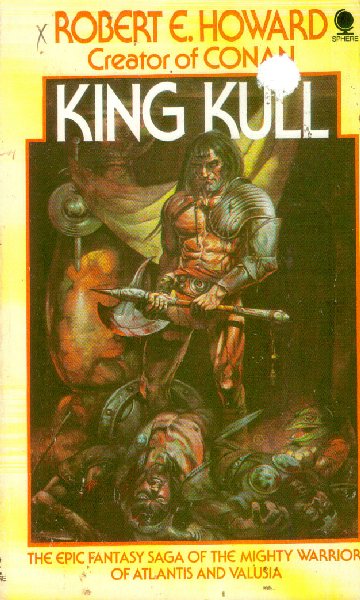
Background Colour: -White- -NavajoWhite- -Wheat- -Beige- -AntiqueWhite- -LightGray- -Silver- -BurlyWood- -Tan- -Black- -Blue-
Text Colour: -Black- -Brown- -Blue- -Green- -Red- -Yellow- -White- -Orange- -Silver-
Untitled fragment first published in Kull, 1978. (Cover below is from King Kull, 1976, which Kull was a reissue of.)
Completed and named by Lin Carter.
Three men sat at a table playing a game. Across the sill of an open window there whispered a faint breeze, blowing the filmy curtains about and bearing to the players the incense of roses and vines and growing green things.
Three men sat at a table—one was a king—one a prince of an ancient house—one was the chief of a terrible and barbaric nation.
“Score!” quoth Kull, king of Valusia, as he moved one of the ivory figures. “My wizard menaces your warrior, Brule.”
Brule nodded. He was not as large a man as the king, but he was firmly knit, compactly yet lithely built. Kull was the tiger, Brule was the leopard. Brule was a Pict and dark like all his race. Immobile features set off a fine head, powerful neck, heavy trim shoulders and a deep chest. These features, with the muscular legs and arms, were characteristics of the nation to which he belonged. But in one respect Brule differed from his tribesmen, for whereas their eyes were mostly hard scintillant brown or wicked black, his were a deep volcanic blue. Somewhere in his blood was a vagrant strain of Celt or of those scattered savages who lived in ice caves close to the Arctic Circle.
“A wizard is a hard man to beat, Kull,” said this man, “in this game or in the real red game of battle—well, there was once when my life hung on the balance of power between a Pictland wizard and me—he had his charms and I had a well-forged blade—” He paused to drink deeply from a crimson goblet which stood at his elbow.
“Tell us the tale, Brule,” urged the third player. Ronaro, prince of the great Atl Volante house, was a slim elegant young man with a splendid head, fine dark eyes and a keen intellectual face. He was the patrician—the highest type of intelligent aristocracy any land has ever produced. These other two in a way were his antithesis. He was born in a palace; of the others, one had been born in a wattle hut, the other in a cave. Ronaro traced his descent back two thousand years, through a line of dukes, knights, princes, statesmen, poets, and kings. Brule could trace his ancestors vaguely for a few hundred years and he named among them skin-clad chiefs, painted and feathered warriors, shamans with bison-skull masks and finger-bone necklaces—one or two island kings who held court in mud huts, and a legendary hero or two, semi-deified for feats of personal strength or wholesale murder. Kull did not know who his own parents were.
But in the countenance of all three gleamed an equality beyond the shackles of birth and circumstance—the aristocracy of the Man. These men were natural patricians, each in his own way. Ronaro’s ancestors were kings; Brule’s, skin-clad chiefs; Kull’s might have been slaves or chieftains. But about each of the three was that indefinable element which sets the superior man apart and shatters the delusion that all men were born equal.
“Well,” Brule’s eyes filled with brooding reminiscence, “it happened in my early youth; yes, in my first war raid. Oh, I had killed a man or so in the fishing brawls and at the tribal feasts, but I had not yet been ornamented with the scars of the warrior clan—” he indicated his bare breast where the listeners saw three small horizontal marks, barely discernible in the sun-bronze of the Pict’s mighty chest
Ronaro watched him with a never-failing interest as he talked. These fierce barbarians with their primitive vitality and straight-forwardness intrigued the young prince. Years in Valusia as one of the empire’s strongest allies had wrought an outward change on the Pict—had not tamed him, but had given him a veneer of culture, education and reserve. But beneath that veneer burned the blind black savage of old. To a greater extent had this change worked on Kull, once warrior of Atlantis, now king of Valusia.
“You, Kull, and you, Ronaro,” Brule said, “we of The Islands are all one blood, but of many tribes, and each tribe has customs and traditions peculiar to itself alone. We all acknowledge Nial of the Tatheli as over-king, but his rule is loose. He does not interfere with our affairs among ourselves, nor does he levy tribute or taxes, as the Valusians call it, from any except the Nargi and the Dano and the Whale-slayers who live on the isle of Tathel with his own tribe. These he protects against other tribes and for that reason he collects toll. But he takes no toll of my tribe, the Borni, nor of any other tribe. Neither does he interfere when two tribes go to war—unless some tribe encroaches on the three who pay tribute. When the war is fought and won, he arbitrates the matter, and his judgment is final—what stolen women shall be returned, what payment of war canoes made, what blood price paid, and so on. And when the Lemurians or the Celts or any foreign nation or band of reavers come against us, he sends forth for all tribes to put aside their quarrels and fight side by side. Which is a good thing. He might be a supreme tyrant if he liked, for his own tribe is very strong, and with the aid of Valusia he might do as he liked—but he knows that though he might, with his tribes and their allies, crush all the other tribes, there would never be peace again, but revolt as long as a Borni or a Sungara or a Wolf-slayer or any of the tribesmen was left alive.”